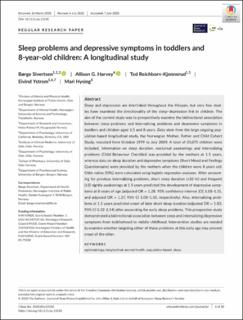Sleep problems and depressive symptoms in toddlers and 8-year-old children: A longitudinal study
Journal article, Peer reviewed
Published version

Åpne
Permanent lenke
https://hdl.handle.net/11250/2730839Utgivelsesdato
2021Metadata
Vis full innførselSamlinger
Sammendrag
Sleep and depression are interlinked throughout the lifespan, but very few studies have examined the directionality of the sleep–depression link in children. The aim of the current study was to prospectively examine the bidirectional association between sleep problems and internalizing problems and depressive symptoms in toddlers and children aged 1.5 and 8 years. Data stem from the large ongoing population‐based longitudinal study, the Norwegian Mother, Father and Child Cohort Study, recruited from October 1999 to July 2009. A total of 35,075 children were included. Information on sleep duration, nocturnal awakenings and internalizing problems (Child Behaviour Checklist) was provided by the mothers at 1.5 years, whereas data on sleep duration and depressive symptoms (Short Mood and Feelings Questionnaire) were provided by the mothers when the children were 8 years old. Odds ratios (ORs) were calculated using logistic regression analyses. After accounting for previous internalizing problems, short sleep duration (≤10 hr) and frequent (≥3) nightly awakenings at 1.5 years predicted the development of depressive symptoms at 8 years of age (adjusted OR = 1.28; 95% confidence interval [CI] 1.08–1.51, and adjusted OR = 1.27, 95% CI 1.08–1.50, respectively). Also, internalizing problems at 1.5 years predicted onset of later short sleep duration (adjusted OR = 1.83, 95% CI 1.32–2.54) after accounting for early sleep problems. This prospective study demonstrated a bidirectional association between sleep and internalizing/depressive symptoms from toddlerhood to middle childhood. Intervention studies are needed to examine whether targeting either of these problems at this early age may prevent onset of the other.
